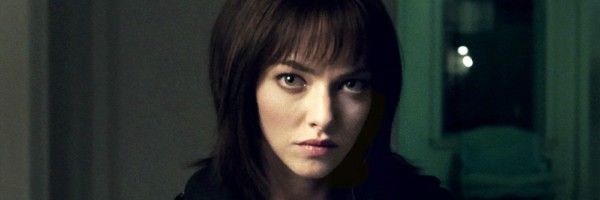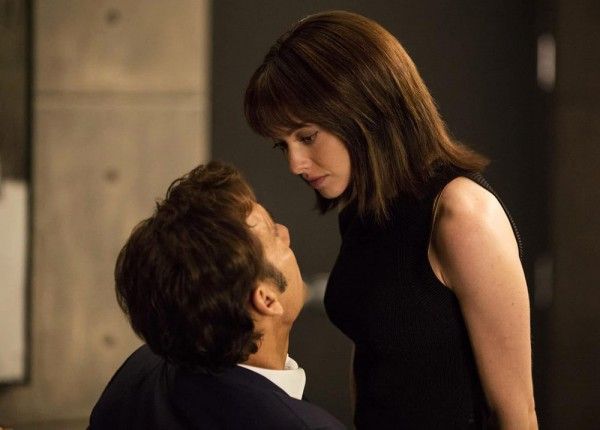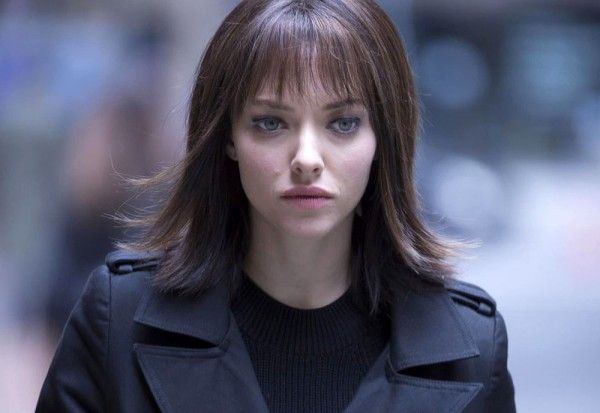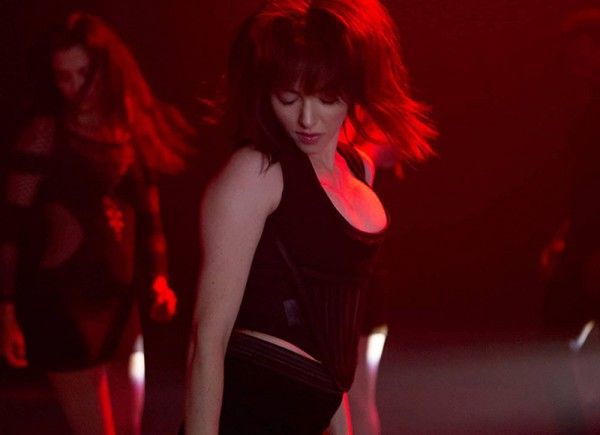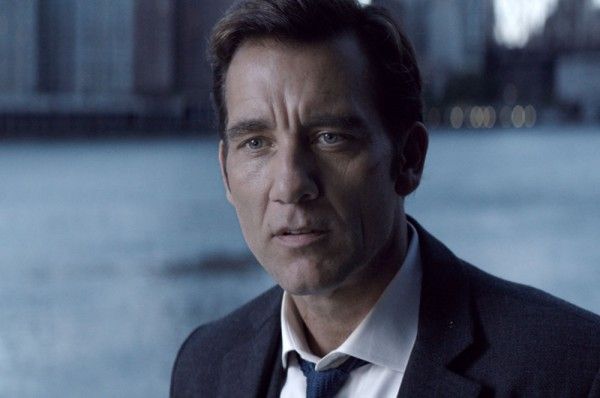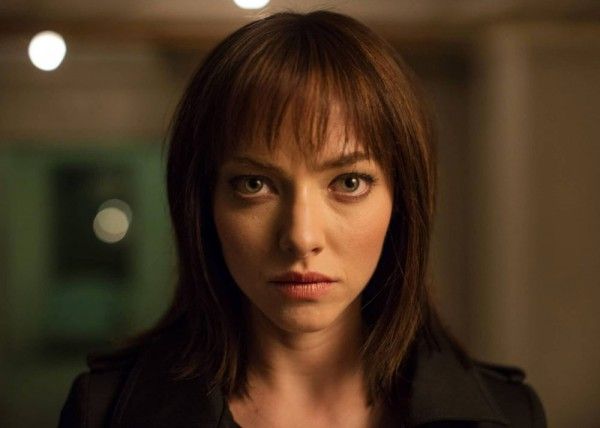From writer/director Andrew Niccol (Gattaca), the sci-fi thriller Anon (available to stream at Netflix on May 4th) follows Sal Frieland (Clive Owen), a detective in a world where everyone’s lives are recorded by the authorities and crime has largely ceased to exist, but in return, we no longer have any privacy or anonymity. In trying to solve a mysterious series of murders, Frieland comes across a woman with no identity and no history, invisible to everyone and known only as the Girl (Amanda Seyfried), and as he becomes more enthralled with her, she realizes the danger that also presents.
During this 1-on-1 phone interview with Collider, filmmaker Andrew Niccol talked about the origin of Anon, the issue of the lack of privacy in our own lives, why he avoids social media, how technology narrows us, as human beings, how he ended up releasing this film through Netflix, why he wanted Clive Owen and Amanda Seyfried for their roles, and that maybe this film can be a cautionary tale.
Collider: This story is equal parts fascinating and terrifying. What was the origin of this? Did it start with an idea, or were there themes that you wanted to explore?
ANDREW NICCOL: For a long time, I wanted to do a story relating to privacy and the war for privacy, and how we have given it away without a fight. We’ve already lost, and we did it all for convenience. I thought that was an interesting jumping-off point.
When did you really start to think about your own loss of privacy? Was it one thing that made you start thinking about that, as a concept, in your own life?
NICCOL: No, it was more a combination of events, in my own life. It’s the way it is in the movie. In reality today, we’re given a false choice. People say that, if you’ve got nothing to hide, you’ve got nothing to fear. I think that’s not correct. It’s more the way the Girl puts it when she says, “It’s not that I have something to hide, I’ve got nothing I want you to see.” I think that things like the recent events, with the controversy around Facebook, will maybe give people pause now, with how much they have given away. Maybe they are not going to be so comfortable about that.
Are there things that you do, yourself, to avoid being so public? Do you avoid social media?
NICCOL: Yeah, because I have researched this area. Social media is not attractive to me, for many reasons, so I don’t do any of that. I’m not reclusive, but it’s the old cliché of, if you aren’t paying for Google or Facebook, then you’re the product. I’ve known that for a long time, and I’d rather not be the product.
When you take the time to think about it, it definitely seems scary.
NICCOL: Yeah. At one point, I thought maybe encryption is the way to go, but theoretically, anything that can be encrypted can be reversed and decrypted. Once you get to that point, you lie down and take a moment. There is really no way to opt out. Right now, you and I are both geo-tagging and telling on ourselves. That’s the bargain we have made.
I know you’ve referred to this film as “Cambridge Analytica on crack,” so when you heard about that scandal, did it make this film feel a bit less sci-fi based and more reality based?
NICCOL: It’s terrible, the most controversial thing you say in an interview is always the headline. I should have learned that lesson by now. It didn’t surprise me. I’ve been thinking about it, for a long time. I don’t think of the movie as futuristic. I think of it as a parallel present, as I call it. We’ve all seen it, where people are walking around staring at their devices. All I’ve done is improved the technology and make it less ugly and awkward by just putting it in your head. It’s just a very small step from being that. That’s the here and now, really. We are all life-blogging. That’s nothing new. People have been trying it since the ‘80s. Cops now wear body cams and they also tamper with those devices, like how the Girl was editing memories. If you go to any concert, you can see a sea of phones, recording. We are already doing it. Most people on social media are documenting and retouching their lives. For me, it’s not a big step. Look at Facebook. I guess people are there to share their information, so maybe they knew that Facebook had their cell phone number, but maybe they didn’t realize that Facebook had all of their contacts’ cell phone numbers. It might give people pause. Maybe this film can be a cautionary tale.
It’s interesting because there does seem to be such an imbalance between humanity and technology for people. When I walk into a coffee shop and look around and see people sitting there together, but not talking to each other because they’re on their own phones, it’s a lonely feeling and I wonder why people aren’t just communicating with the person that they’re sitting next to.
NICCOL: Right, and I think that’s sad. If you look at a lot of technology and where it’s going, it doesn’t make us broader as human beings, it just makes us narrower and narrower. You used to go to a bookstore, when they did exist, and you would go in there and have to look for a book. Then, you had the happy accident of seeing lots of other books that you didn’t go in there for. Now, you just look at one book online, on Amazon, and they say, “You might also like this . . .” So, they are making us narrower and narrower, and more and more divided. It’s ironic to me that technology that was supposed to bring us together is actually dividing us. That’s where it’s going. Maybe that’s another movie.
How did you end up with this film at Netflix, and how do you feel about releasing the film on a streaming service?
NICCOL: If you think about it, unless you’ve got a tent pole movie, it’s not going to last very long in the theaters. Most of the life of your movie will be on video, in some form. How many people saw Gattaca in theaters? Somehow it’s still relevant and being watched, but no one is going to theaters to watch it. For me, it’s mostly about the story and getting the film seen. Netflix definitely has a lot of eyeballs. Ironically, with this movie, there are no screens, at all, because it’s all in your head. Your screen is in your head, in what I call your mind’s eye. The world is changing how people consume content. I don’t like to use that word, but it’s there. For me, it’s a story and your story should work, no matter what format it’s on.
This film primarily centers around just two characters, so I would imagine that casting must have been very important. What are the qualities that Amanda Seyfried has, that allowed her to make a character like this compelling, even though she don’t really have a backstory that we’re let in on?
NICCOL: There’s something otherworldly about Amanda. If you want expressive eyes, and much of the story is told through the eyes, Amanda has that. Also, even though she is quite petite, when she is waving a gun around, it gets your attention. There’s a bad-ass quality to her that I like. The other thing I like about her is that she has the intelligence to pull off quite a complex character. I’ve never seen a character before that, on one hand, craves privacy and, on the other hand, craves intimacy. A lot of the victims, in this film, are people that she’s been intimate with. She has all of those qualities.
Because you had previously worked with her before, on In Time, was she the only person that you thought of for this?
NICCOL: I’ve worked with Ethan Hawke, a few times, and you develop a short-hand. When you don’t have all the money in the world, it’s quite good to work with someone that you trust and you know they can go where you want them to go. All you have to do is slightly lean them in one way or another. That makes my job easier.
What led you to Clive Owen?
NICCOL: The thing I loved about Clive is that there’s a juxtaposition in the movie between a noir detective and this futuristic technology. It’s something of a throwback, and Clive has got this been there, done that quality that I liked, and I liked that for the character. He’s almost born out of his time. His character is also really interesting. He’s literally seen too much. Mostly, what he watches are the last moments of other people’s lives. I think he grows to envy the fact that the Girl has no digital footprint. She has basically disappeared. She doesn’t watch anyone, herself. She has interesting ethics. She will only look at what you want her to see. I think that’s an interesting character, in these times.
I though how you shot some of this, with the point of view perspective of it, was so interesting.
NICCOL: It’s fun to do the subjective and objective points of view, which are in different aspect ratios. The weird thing is that we are so used to watching different screens that you don’t really notice that. Even in the theater, in the U.K., where it’s even more extreme, it oddly goes right by you because you’re just used to it.
Do you have any idea what’s next for you, as a filmmaker? Do you know what story you want to tell next?
NICCOL: There aren’t many filmmakers that have the luxury of actually controlling their destiny. I can only make what someone will write a check for, so you get a distorted view of what my filmography could be. I only make what people will pay for. I’m too superstitious to say what I’m going to do next because I don’t want to jinx it. There are so many reasons a film doesn’t get made, and I don’t want to add to that list.
Well, I appreciate you talking to be about this film. I was just so fascinated with the film because it does feel like it’s not that far off from reality.
NICCOL: Yes, I’m afraid you are right.
Anon is available to stream on Netflix on May 4th.

